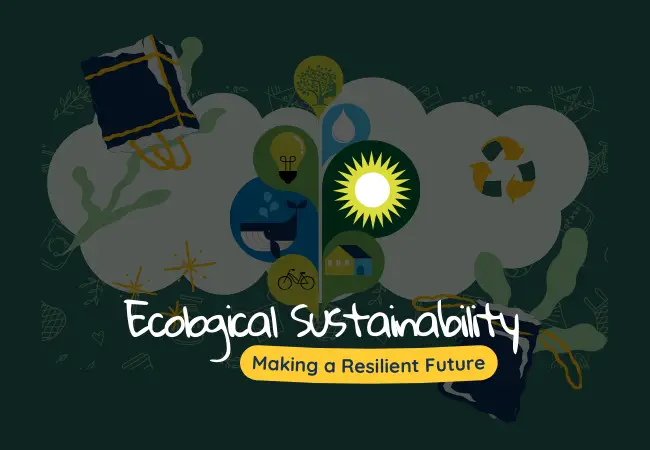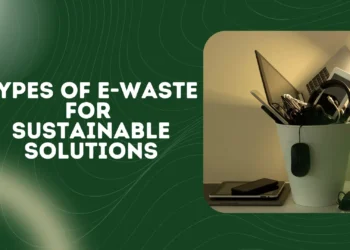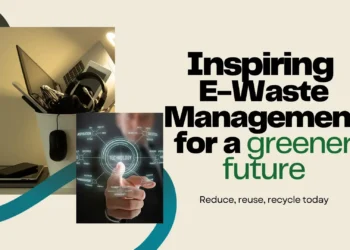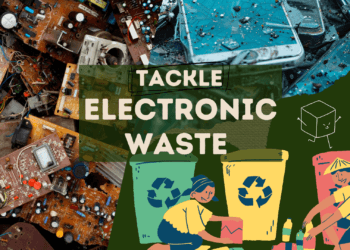Have you ever thought about what happens to your old mobile phones, laptops, or broken…

Is ecological sustainability helping to create a resilient future for our planet?
Introduction
The Earth is facing severe challenges, such as pollution, climate change, deforestation, and the loss of wildlife. These problems threaten not only the natural world but also human life. Many people are turning to ecological sustainability as a solution to tackle these issues. But what does ecological sustainability mean? It is a way of living and using resources so that nature can regenerate and support future generations. It focuses on reducing environmental harm, protecting ecosystems, and promoting the responsible use of natural resources.
Ecological sustainability helps build a strong future for Earth where people and nature can live well, even with problems like global warming or fewer resources. By using clean energy, saving forests, reducing waste, and protecting animals, we can help balance what people need and the planet’s health.
But the main question is, does this approach truly work? Are we doing enough to protect our environment and secure Earth’s more substantial, safer future? This article will explore ecological sustainability, its impact on making a resilient future, and whether these efforts are enough to solve our environmental problems. Together, we’ll discover how small steps can make a big difference for our planet.
What does ecological sustainability mean?
Ecological sustainability means using natural resources in a way that they can keep supporting life on Earth now and in the future. It is about taking care of nature, protecting plants and animals, and making sure people’s needs don’t harm the environment. Activities like planting trees, conserving water, and using renewable energy are all part of ecological sustainability because they help the Earth recover and stay healthy.
The main objective of ecological sustainability is to prevent environmental damage, such as pollution, deforestation, and overuse of earth resources.
By practising ecological sustainability, we ensure that nature continues to give us clean air, freshwater, and good soil for growing food in the future. Ecological sustainability means living peacefully with nature by using less waste, saving animals, and using resources wisely. This helps make the Earth a better and healthier place for everyone.
Why is ecological sustainability important?
Ecological sustainability is important because it helps protect the environment and ensures that natural resources are available for future generations. Every living thing on Earth depends on the environment for survival. We need clean air, fresh water, healthy soil, and biodiversity. However, activities like the purposeful clearing of forested land, creating pollution, and excessive resource use ca be damage the planet’s ecosystem. For that emerge many problems, such as climate change, loss of wildlife, and natural disasters.
Let’s think profoundly and devote ourselves to ecological sustainability. We can reduce the damage to the planet and balance human needs and nature. For example, if we using renewable energy like solar and wind power in place of burning fossil fuels helps reduce pollution as well as slow global warming. Also, protecting deforestation and wildlife helps maintain biodiversity, which is essential for healthy plant ecosystems.
Ecological sustainability is also crucial to creating a resilient future. It helps prevent resource shortages, supports economic growth without harming the environment, and protects communities from disasters like floods or droughts.
In simple terms, ecological sustainability is about taking care of nature so that it can continue to take care of us. It’s important because a healthy planet means a healthier, happier life for everyone now and in the future.
What are some of the examples of ecologically sustainable research gates?
Ecologically sustainable research gates are projects, initiatives, or actions that help support and promote ecological sustainability by protecting the environment and balancing people’s and nature’s needs. These examples focus on using resources responsibly, preserving ecosystems, and reducing harm to the planet. Here are some important examples ideas of ecologically sustainable practices and initiatives:
- Renewable Energy Projects: Using renewable energy sources like solar, wind, and hydropower in our daily lives is a great idea for promoting ecological sustainability. These valuable projects reduce fossil fuel use, prevent pollution, and contribute to reduced global warming.
- Reforestation Programs: Planting trees helps restore forests that have been cut down, improving air quality, protecting wildlife habitats, and slowing climate change. Reforestation supports ecological sustainability by assisting ecosystems in recovering and thriving.
- Sustainable Agriculture: Using fewer chemicals in farming, saving water, and keeping the soil healthy are great examples of ecological sustainability. Methods like planting different crops, organic farming, and growing trees on farms help make sure the land stays rich and good for farming in the future.
- Wildlife Conservation Projects: Protecting animals that are in danger of disappearing and their homes is very important. It helps keep all living things in nature working together. By saving wildlife, we can support ecological sustainability and keep nature healthy and balanced.
- Water Conservation Initiatives: Projects that save water, like collecting rainwater or repairing leaks, are very important for ecological sustainability. Saving water helps make sure there is enough for people in the future and keeps the environment safe from harm.
- Recycling and Waste Management: Encouraging people to recycle, reduce waste, and compost is a practical way to support ecological sustainability. Proper waste management reduces pollution and saves resources like paper, plastic, and metals.
- Eco-friendly Urban Design: Cities can use sustainable designs such as green buildings, rooftop gardens, and energy-efficient transport. These projects aim to reduce environmental harm and make city living more eco-friendly.
- Marine Conservation Efforts: Projects that help save water, like collecting rainwater or fixing leaks, are very important for ecological sustainability. Saving water makes sure we have enough for the future and helps protect the environment from harm.
- Clean Energy Transportation: Electric vehicles, bike-sharing programs, and public transport systems powered by renewable energy are excellent examples of projects that promote ecological sustainability by reducing air pollution and greenhouse gas emissions.
- Education and Awareness Campaigns: Teaching people about the importance of ecological sustainability is the another best way to helps encourage sustainable lifestyles. Awareness programs and campaining inspire communities to conserve energy, plant trees, and protect natural resources.
These examples show that ecological sustainability is not just about protecting nature. It’s also about making a better future for us and the people who come after us. By supporting projects like using clean energy, saving plants and animals, and using resources wisely, we can keep the Earth healthy and safe. These efforts help make a world where both people and nature can live happily together.
In conclusion, ecological sustainability means taking care of nature so it can keep supporting life on Earth. It is about using resources like water, trees, and energy in a way that helps people today and in the future. By saving water, planting trees, reducing waste, and protecting animals, we can help nature stay healthy and strong.
Ecological sustainability also teaches us to live in harmony with the environment. This means using less of what we don’t need, protecting the places where animals live, and making sure our actions don’t harm the planet. When we take care of nature, it gives us clean air to breathe, fresh water to drink, and good soil to grow food.
Everyone can help with ecological sustainability by doing simple things like recycling, saving energy, or planting a garden. These small actions might not seem like much, but they can make a big difference in keeping the Earth healthy for future generations. When we practice ecological sustainability, we are helping to create a better future for both people and nature. If we all work together, we can make sure our planet stays a beautiful and safe place for everyone now and for years to come.




Comments (0)